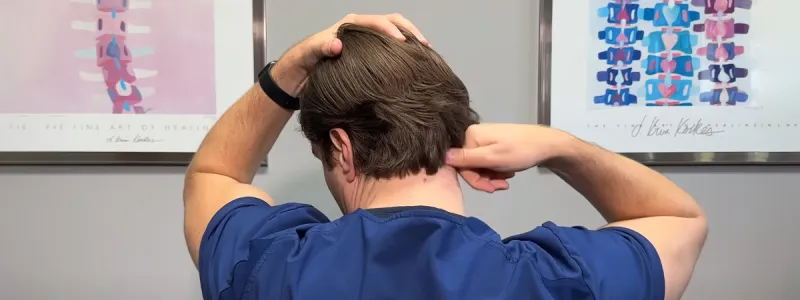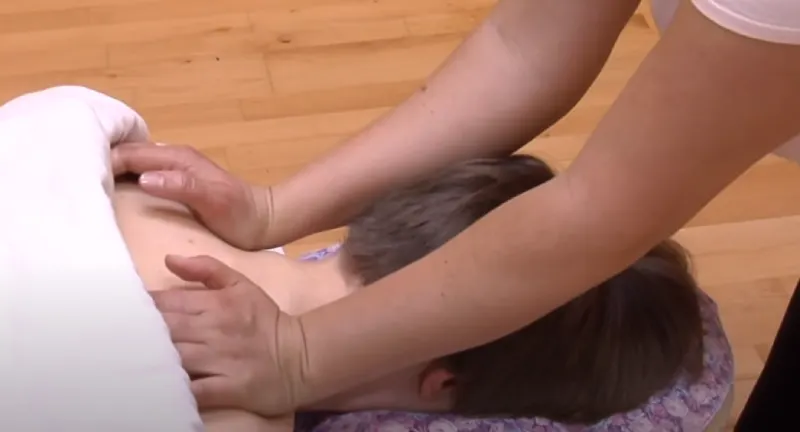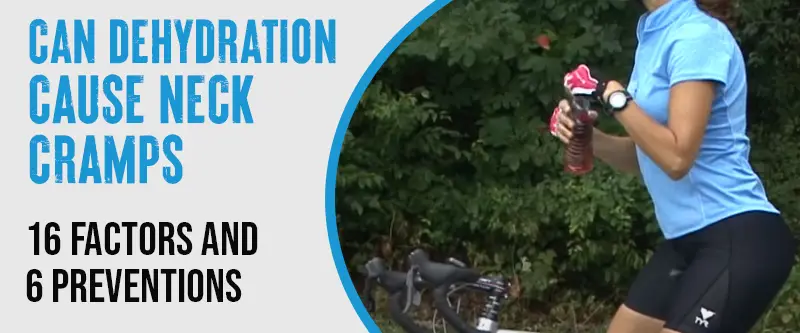You become dehydrated when your body loses more fluid than you consume while cycling. Your body functions differently when it has less water, which affects its balance of minerals (salts and sugars).
Dehydration is the most common cause of neck cramps and pain while cycling. The dehydrated body develops tighter muscles, ligaments, and tendons, which can lead to neck stiffness. Discs are 80% water at birth, and that ratio decreases as you get older.
This article will explore the link between dehydration and neck cramps while cycling and provide tips on preventing and treating them.
Can Dehydration Cause Neck Cramps? 4 Key Symptoms

While there are numerous reasons why you might experience neck cramps, one aspect that is often overlooked is dehydration during cycling. We will delve into dehydration and neck cramps, exploring how dehydration affects the muscles and tendons in the neck and discussing other related effects.
Effects of Dehydration on the Neck
When the body is dehydrated, the muscles in the neck and other body parts, including cycling, are affected in various ways. Here are some of how dehydration can affect the neck muscles and lead to cramps:
Reduced Blood Supply
Dehydration reduces the amount of water in the body, which, in turn, lowers blood volume. The reduced blood volume causes a drop in blood pressure, reducing blood flow to neck muscles. The reduced blood supply to the muscles makes them work harder, leading to muscle fatigue and, eventually, cramps during cycling.
Increased Lactic Acid Production
The body makes lactic acid as part of its energy production process. In dehydrated bodies, there is a reduction in the amount of water available to dilute the lactic acid. This can build up lactic acid in the muscles, leading to cramping and stiffness during cycling.
Reduced Electrolytes
The body’s electrolytes regulate muscle function, including during cycling. When dehydrated, electrolytes such as sodium, potassium, and magnesium decrease. The reduced electrolyte levels can cause muscle cramps and contractions.
Dehydration Causes Neck Pain
When the body experiences dehydration, the discs between the vertebrae, which absorb shock, can become rigid and less effective, leading to increased strain on the neck and back muscles. This increased strain can contribute to discomfort, stiffness, and even neck spasms because of inadequate hydration.
Neck Stiffness and Dehydration
Dehydration affects the elasticity and function of muscles, including those in the neck. The neck muscles can tense when the body lacks sufficient hydration, leading to stiffness and discomfort. Dehydration can contribute to the occurrence of muscle cramps, particularly affecting the delicate muscles of the neck.
Dehydration Headache
Even mild dehydration can cause headaches, affecting daily comfort and well-being. Dehydration symptoms, such as fatigue, dizziness, extreme thirst, and dry mouth, can exacerbate the discomfort associated with headaches.
Dehydration and Shoulder Pain
Besides neck discomfort, dehydration can lead to shoulder pain. The muscles in the shoulders can become stiff and sore when the body lacks adequate hydration, ultimately leading to painful muscle spasms or general discomfort.
Dehydrated Neck Skin
Dehydration affects the skin all over our body, including the delicate skin on our necks. When dehydrated, our skin loses moisture, becoming dry, flaky, and sometimes even itchy. This can lead to discomfort and exacerbate existing neck issues.
Neck Cramping
Neck cramping is a common complaint, especially among those who spend long hours hunched over desks or screens. Dehydration can exacerbate muscle cramps in the neck, causing stiffness, pain, and reduced mobility.
Cramp on Neck
Muscle cramps in the neck can occur for various reasons, including dehydration. When our muscles lack adequate hydration, they are more prone to spasms and cramps, leading to discomfort and restricted movement.
Dehydration and Stiff Neck

Dehydration can contribute to a stiff neck, making it challenging to swing the head. Lack of hydration affects the elasticity of muscles and connective tissues, leading to stiffness and discomfort.
Dehydration and Shoulder Pain
Just as dehydration can affect the neck, it can also contribute to shoulder pain. The muscles and tendons in the shoulder area rely on adequate hydration to maintain flexibility and function properly. Dehydration can lead to muscle tightness, inflammation, and shoulder pain.
Sore Neck Dehydration
Dehydration can exacerbate neck soreness, making it more challenging to find relief. Without proper hydration, the muscles in the neck may become tense and tired, increasing discomfort and soreness.
Lack of Water Causes Neck Pain
Hydration is essential to the health and function of all body systems, including the neck’s muscles and tissues. When you do not drink enough water, you may end up dehydrated, which can lead to neck pain through muscle cramps, stiffness, and reduced flexibility.
Role of Spinal Discs in the Neck
Spinal discs, including those between the vertebrae in the spine, act as shock absorbers and help cushion the vertebrae, preventing them from rubbing against each other during activities like cycling. The discs are predominantly water, providing the flexibility needed to absorb shock.
During dehydration, the spinal discs lose some water content and become less flexible. This reduced flexibility can cause the vertebrae in the neck to rub against each other during cycling, leading to inflammation, pain, and reduced mobility.
Dehydration and Nerve Cell Signaling
Nerve cells transmit signals between the brain and other body parts, including the cycling muscles in the neck. Dehydration decreases the water supply to the nerve cells decreases. This can lead to several effects, including:
- Inflammation: Dehydration can cause inflammation, irritating and damaging nerve cells around the neck. The inflammation can cause neck cramps, pain, and reduced mobility.
- Irritation: Dehydration can also irritate the nerve cells, making them more sensitive to pain signals. This can make neck cramps more painful and persistent.
- Pain: Dehydration can cause pain in the body, which can be felt in the neck and other areas.
6 Symptoms of Severe Dehydration
Dehydration can manifest in various symptoms, and severe dehydration requires prompt attention because of its potential impact on overall health. Dehydration symptoms should be understood to identify and treat this condition effectively.
- Extreme Thirst: Individuals experiencing severe dehydration may feel an intense and persistent thirst that is difficult to quench.
- Very Dry Mouth: Severe dehydration can lead to a parched sensation in the mouth, often accompanied by discomfort and difficulty swallowing.
- Rapid Breathing and Heart Rate: Severe dehydration may cause individuals to breathe rapidly and experience an elevated heart rate, reflecting the body’s attempt to compensate for the lack of adequate fluids.
- Fever: In cases of severe dehydration, individuals may develop a fever as the body struggles to maintain its internal balance.
- Little or No Urine Output: One of the noticeable signs of severe dehydration is a significant decrease in urine output, which may be accompanied by dark-colored urine when it is produced.
- Mental and Emotional Changes: Severe dehydration can compromise the body’s vital functions and lead to irritability, drowsiness, or confusion.
Reduce Neck And Shoulder Muscle Spasms: 7 Preventions

Staying hydrated is essential for overall body health and critical for preventing neck cramps caused by dehydration. Here are some strategies you can use to stay hydrated while cycling:
- Massage Your Neck Muscles: Massaging your neck muscles reduces muscle spasms and tension. Use a circular motion with your fingertips to ease the tightness in the affected areas.
- Stay Active (If You Can): Gentle exercise and movement can promote blood flow and flexibility, which may help reduce muscle spasms. If possible, engage in light activities such as walking or stretching to loosen your neck and shoulder muscles.
- Address Stress: Stress can contribute to muscle tension and spasms in the neck and shoulders. Stress-relief techniques like deep breathing, meditation, and yoga help relax your muscles and ease stress-related spasms.
- Maintain Proper Sleep Posture: Ensure that your head and body are correctly aligned while sleeping to avoid unnecessary strain on your muscles. Use a supportive pillow and mattress for proper spinal alignment and fewer muscle spasms during sleep.
- Drink enough water: The human body comprises 60% water. Drinking enough water is essential for maintaining the body’s balance. Women Drink 2.7 liters (91 ounces) of water, while men should drink about 3.7 liters (125 ounces).
- Avoid caffeine and alcohol: Caffeine and alcohol can dehydrate the body, so limiting the intake of these beverages is best.
- Eat foods with high water content: Water-rich fruits and vegetables keep the body hydrated. Some examples include cucumbers, watermelons, strawberries, oranges, and pineapple.
Dehydration and Neck Cramps: 4 Treatments
If you have already developed neck cramps due to dehydration from cycling, several remedies can relieve the pain. Here are some effective treatment options:
- Stretching: Stretching and cycling are effective ways to alleviate neck pain caused by cramps. They help relieve muscle tension and improve blood flow to the affected area.
- Apply heat or ice: Applying heat or ice to the affected area can also help soothe neck pain. Ice is best for the first 48 to 72 hours after the cramp begins, while cycling heat can be used afterward to increase blood flow and relax muscles.
- Taking pain medications: Over-the-counter pain medications like ibuprofen or acetaminophen can help to relieve neck pain and cycling. Seek medical advice for underlying health conditions.
- Relaxing: Stress can aggravate neck cramps, so activities like meditation, deep breathing, yoga, or cycling can help to relax your body and relieve tension.
Importance of Seeking Medical Attention
It is crucial to seek medical attention if you experience severe, persistent neck pain or accompanying symptoms caused by dehydration while cycling. Fever, nausea, and weakness are some of these symptoms.
Symptoms that should prompt medical attention while cycling include difficulty moving your arms or legs, weakness, numbness, or pain radiating to your chest. The underlying cause of your neck cramps while cycling can be determined by a thorough examination performed by a doctor.
Conclusion
Dehydration can cause multiple symptoms in our body, including neck cramps, which can be very painful and negatively impact our daily functions. To prevent it, cycle, drink at least 1.2 liters of water daily, avoid caffeine and alcohol, and eat high-water-content foods.
In case you are already experiencing neck cramps due to dehydration, there are many remedies, such as stretching, applying heat or ice, taking pain medication, and relaxation techniques that could be used to relieve the pain. Regular monitoring of your hydration levels can be effective in avoiding dehydration-related neck cramps. Remember, prevention is always better than cure.
FAQs
Is There Anything That Causes Neck Cramps?
A sudden muscle strain usually causes neck spasms and should subside within a week. Persistent or worsening back pain may indicate osteoarthritis or a herniated disc. Consult your doctor if your neck pain does not improve within a week.
How Can Severe Dehydration Be Detected?
The symptoms of severe dehydration include dizziness, sunken eyes, fainting, rapid breathing, and a racing heart. Children can lose over 10% of their body weight. Dehydration of this type requires immediate medical attention. Salt-containing IV fluids may be administered to you.
How Long Do Neck Cramps Last?
The symptoms can last from a few minutes to several weeks. Sometimes, the pain persists even after the spasms have stopped. Injuries or musculoskeletal conditions that cause neck spasms should be treated medically. Most neck spasms clear up within a week on their own.
Are Neck Cramps Dangerous?
Medications are needed for neck spasms caused by an injury or musculoskeletal problem. Most neck spasms don’t last long and disappear within a week. Meanwhile, you can take steps at home to feel better.
What Causes Neck Cramps?
Lots of things can cause spasms in the neck. Most people get neck sprains or strains. The neck has over 20 muscles, ligaments, nerves, and tendons. Minor tissue damage or overexertion can cause these muscles and tissue to tighten in response, causing spasms.


